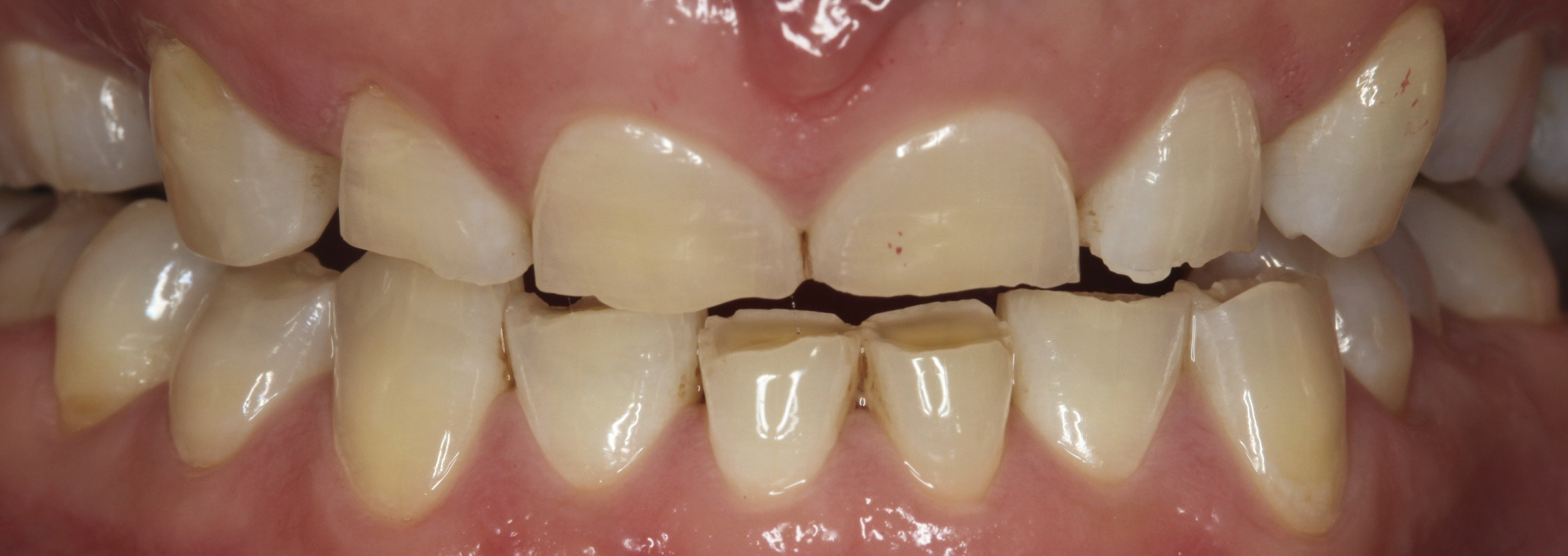If your teeth are getting shorter, you may be suffering from teeth wear which can be attributed to three general causes:
- Erosion – from acids in the diet or anorexia/reflux
- Attrition – from grinding teeth
- Abrasion – from over aggressive tooth brushing

Above photo shows worn teeth as a result of excessive grinding and acid erosion.
Erosion
Excessive soft drink or fruit drink consumption causes tooth enamel erosion. Athletes often suffer tooth erosion due to constantly sipping on energy drinks, for example. Teeth need a break from snacking and drinks other than water – saliva is a powerful defence against erosion and helps teeth mineralisation. Soft drinks are best had at mealtimes with only water in between meals. That’s why those with Xerostomia (dry mouth or low salivary flow) can experience enamel erosion. Those with diets high in sugar and starches are also at risk from tooth erosion.
Stomach acids are also a cause of erosion and those most likely to be affected by this are people who suffer with Gastro-oesophageal reflux disease (GORD) or Bulimia.
Attrition
Bruxism (grinding or clenching of teeth), often subconsciously during the night, leads to teeth wear and short appearance over time. Stress and anxiety often contribute towards grinding but it can also be a symptom of crooked or imperfect teeth leading to an uneven bite or even sleep apnoea.
Abrasion
Teeth abrasion is usually attributable to incorrect brushing and is usually noticeable near the gum line. Brushing for too long, with too much pressure or with the wrong technique such as long fast horizontal scrubbing all can result in tooth abrasion.
Can worn teeth cause any problems?
Poor appearance, often with the teeth appearing shorter, is often the first symptom people notice. Excessive wear can also lead to functional problems with chewing. Sensitivity is often noted, particularly with acid erosion when the enamel is eroded and dentine is exposed.
What do I do to fix my teeth?
Dental erosion is preventable with proper diet, oral hygiene and regular dental care. Visit your dentist regularly and you can identify and treat any problems at an early stage. The lost surface of the tooth may need to be replaced with filling materials or crowns. If you grind your teeth, your dentist may suggest the wearing of an occlusal splint or ‘night guard’ to protect your newly restored teeth so the same problem does not occur again.
The following should all be considered also:
- Rinse with water after consuming something acidic but do not brush immediately after
- Chew sugar free gum after eating to increase saliva flow.
- Drink fluoridated water
- Use a soft bristled toothbrush and avoid the use of abrasive toothpastes.
- Seek medical treatment for reflux or regular vomiting.

